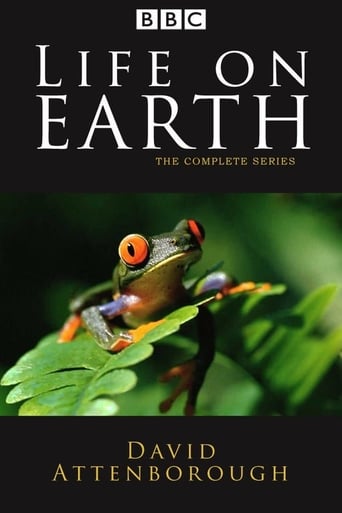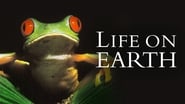Sameer
Sir David Attenborough is the greatest wildlife presenter and 'Life on Earth' most likely is the greatest nature documentary ever made. In the episodes, he talks about the story of life from the first primitive cells to the plants, animals and humans. Overall there are 13 episodes and the last one is for humans. I have this masterpiece documentary, i highly recommend anyone to watch it.
I love the way how he ends the final episode. While he talks about humans began to learn different languages, the hands of people writing in different languages is seen in the video, then David Attenborough takes a paper and write the English language and that is 'Life on Earth'.
Jay Bowles
I still remember watching the first episode of this series with my Father back in 1979. Wow, that is a long time ago! I was about twelve and sat transfixed to the television. I'd never seen anything like it and it really answered so many questions and inspired others. As mentioned elsewhere it is beautifully shot, using a great score and sound effects. Sir David's (he is now!) delivery, enthusiasm, scripting skills and knowledge shine through.Okay the sound is mono and it is not HD, but that doesn't matter. This really is a classic piece of work, like a Hitchcock. It was the first of it's kind and a must watch for all nature / evolution fans. Years later I went to University and the first episode was used as a teaching aid for year one students on the geology course; it was that good.Viewers that are students, must realise that the science of evolution has moved on and not everything is scientifically correct now. But, that adds another edge to this where you can see how our knowledge has moved on so much. For non scientists though there is much to learn and if you find yourself as visually engaged as I was at age twelve then you can then maybe settle down and work your way through the rest of the Sir David Attenborough classics! Believe me the series is well worth a watch even if you're only slightly interested in nature and evolution.
Camera Obscura
Sir David Attenborough is best known for his spectacular natural history projects like "Trials of Life", "Life of Plants", "Life in the Freezer" and this one, "Life on Earth", which made him one of the most characteristic and most-loved television personalities in the history of British television. He also has one of the longest careers in television of anyone still on the air today. Joining the BBC in 1952, he first became a producer for the Talks Department, which handled all non-fiction broadcasts. Originally discouraged from appearing on camera because an administrator thought his teeth were too big, he did went on presenting "Zoo Quest", an educational program featuring animals from the London Zoo, which first aired in 1954. From 1965 to 1969 David Attenborough was the main Controller for BBC2, where he was responsible for the introduction of the first television broadcasts in colour in the UK and soon after he also initiated televised snooker. Many might loath him for the latter, but starting with "Life on Earth" he went on to produce a series of natural history documentaries of truly epic proportions. It was the first in a mammoth trilogy, together with "The Living Planet" (1985) and "Trials of Life" (1990). He showed to have a real talent for screen-writing and presenting skills combined with an expert knowledge of natural history. With his irresistible flair and talent for presentation coupled with stunning cinematic images and a beautiful music score, this was a truly groundbreaking series.Whilst having seen the individual episodes on television several times now, for reviewing I prefer the two-hour VHS-version from 1985, at that time a newly re-edited BBC video-release from the original 16 hour series. Watching this version, it plays much more like a feature film. With the featured geological and ecological time-scale, combined with a perfect integration of sound and image, it's as close a documentary - at least a nature documentary - has ever got to achieve something almost purely cinematic in expression. Still active at 80 years old, Attenborough is currently filming for his latest project, "Life in Cold Blood", a series about reptiles and amphibians, due for completion in 2008.For any (aspriring) biology teacher, show this two-hour version to a group of children in class, and you will never have to answer unnecessary questions about evolution and ecology again.Camera Obscura
Spleen
The opening music - redolent of `Also Sprach Zarathustra' - still sends a shiver down my spine. One hears it and just KNOWS that this is one of THE ground-breaking television documentaries of all time. Some of the detail is bound to be outdated by now; but so far as presentation is concerned, `Life on Earth' is timeless, wearing its years far more lightly than `Cosmos' does, or than `The Civil War' will.The title says it all. Attenborough is giving us nothing less than the story of life on Earth, from the beginning to the present, but concentrating on a few key innovations (episodes bear titles like, `The Invasion of the Land', `A Watertight Skin', `Pouch and Placenta', and so on). The other emphasis is on the poetry of life on Earth. So it's not an even-handed history. What we're getting is a look at the origin of particular things alive today: so birds get much more attention than trilobites; animals get more attention than plants; mammals get more attention than insects; and we hominids have a whole episode to ourselves. This is as it should be. When cockroaches start making documentaries, they can concentrate on what interests THEM; but tough luck, they can't, so it's our show. All the same, watching the final episode (`The Compulsive Communicators'), AFTER having watched all the preceding episodes, gives us a stronger feeling of our true place in evolutionary time than any number of diagrams or Carl Sagan calendars.This gets my vote for being Attenborough's best work, the best television documentary ever made, and possibly (not that I know enough to judge) the BBC's greatest achievement. It's long overdue for a re-screening.


